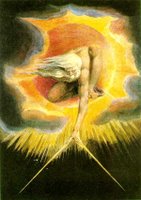 Nobody expects the Spanish Inquisition!
Nobody expects the Spanish Inquisition!In
A flip of the Coyne I discussed the retirement of Father George
Coyne as director of the Vatican Observatory.
Coyne had sharply criticized a commentary by Cardinal Christoph
Schönborn that appeared to boost intelligent design as an alternative to evolution. While Roman Catholics are required to believe that God created the eternal soul and infused it into the first human beings, Christianity's oldest and largest sect has tended to stay clear of the evolution versus creation debate. (Perhaps a lesson was learned in the aftermath of the Galileo affair.) John Paul II even went so far as to say that evolution is “more than a hypothesis,” but it looked like
Schönborn was trying to scuttle back from the late pontiff's declaration.
Was
Coyne, a mere Jesuit priest, forced to step down from the directorship of the Vatican Observatory as punishment for his boldness in criticizing a cardinal? The current pope is not thought to be as friendly toward science as his predecessor and
Schönborn is supposedly one of Benedict
XVI's favorites, lending some credence to the idea that
Coyne was being disciplined. Father
Coyne himself, however, declared quite simply that his retirement was his own idea, that he had been seeking to retire for some time, and that he was glad the Vatican had finally granted his petition to relinquish his duties at the observatory.
The situation was reviewed in detail in an article written by Charles Collins, an American writer living in Rome, and published in
Inside the Vatican, a monthly magazine of Catholic orthodoxy and Church gossip. Collins quoted
Coyne extensively and described
Schönborn's espousal of intelligent design as a triumph for Seattle's Discovery Institute, to which he ascribed the genesis of the cardinal's critical statements on evolution.
Apparently Collins went too far. He and Father
Coyne are now both at risk of suffering the soft cushions and comfy chairs of the inquisitors with nice red uniforms. The freelance heretic sniffers burst into the pages of the November 2006 issue of
Inside the Vatican in the guise of Joseph H.
Gehringer of New Jersey, who penned a furious letter to the magazine's editors:
“INTELLIGENT DESIGN?”
This article in your October issue comes close to being the very worst article ever published in your magazine. And it is certainly the most dishonest and most misleading. It relies entirely upon falsehood, misrepresentation, omission, distortion, and the statements of a priest who has openly and repeatedly expressed heretical ideas on the issue. While pretending to discuss “intelligent design” and the relevant teachings of the Church, Mr. Collins totally distorts the issues and misleads readers on the teaching of the Church and of Pope Benedict XVI.
The most important and serious individual falsehood is Mr. Collins' claim that “Pope Pius XII wrote in Humani Generis that the Church does not forbid the teaching of evolution.” Neither in Humani Generis, nor anywhere else, did Pius XII say any such thing. What he did say comes close to the exact opposite! After discussing evolution and related issues in sections 35 to 38 of that encyclical, Pius XII—in section 41—declared: “We charge the Bishops and the Superiors General of Religious Orders, binding them most seriously in conscience, to take most diligent care that such opinions be not advanced in schools, in conferences or in writings of any kind, and that they not be taught in any manner whatsoever to the clergy or faithful.”
Since this is the only reference to “teaching” in the encyclical, it is obvious that the claim of Mr. Collins is an insidious falsehood.
Equally false, and equally significant (although for a different reason), is the claim of Mr. Collins that the essay of Cardinal Schoenborn “was sponsored by The Discovery Institute.” The reason for this falsehood is quite obvious: Mr. Collins is deliberately trying to confuse readers on two very separate and distinct ideas, each of which can be described by using the term “intelligent design.”
On one hand, The Discovery Institute is a purely secular organization, promoter of “intelligent design” as a “scientific theory,” with no connection whatever to the Catholic Church. On the other hand, Cardinal Schoenborn's essay in The New York Times, and his subsequent commentary elsewhere, dealt entirely with the philosophical (and theological) concept of “intelligent design,” a belief in which is obligatory for Catholics. As Cardinal Schoenborn pointed out, the Catholic must believe in the “intelligent project which is the cosmos...”
Not one word about this teaching of the Church, or its presentation and defense by Cardinal Schoenborn and Benedict XVI, appears in the Collins article. Instead, he devotes more than half of his paragraphs to the scientific question of whether ID qualifies as a “theory.” In other words, the teaching of the Church on the concept of “intelligent design” is deliberately and completely distorted and ignored by discussing only a current “scientific” controversy.
 Instead of quoting Cardinal Schoenborn, or Benedict XVI, or Pius XII, or other relevant Magisterial rulings, Mr. Collins devotes over one-third of his entire article to quotations of Fr. Coyne and comments about him. Of course, in line with his distortion of the real issues involved, he ignores a whole series of public statements by Fr. Coyne which are clearly contrary to Catholic teaching, and probably heretical.
Instead of quoting Cardinal Schoenborn, or Benedict XVI, or Pius XII, or other relevant Magisterial rulings, Mr. Collins devotes over one-third of his entire article to quotations of Fr. Coyne and comments about him. Of course, in line with his distortion of the real issues involved, he ignores a whole series of public statements by Fr. Coyne which are clearly contrary to Catholic teaching, and probably heretical.
Fr. Coyne tells us that Almighty God never “intervenes” in the cosmos. But this is a denial of the possibility of miracles. Why does Mr. Collins ignore this?
Fr. Coyne tells us that Almighty God is not “omnipotent.” But this is a denial of Catholic dogma. Why does Mr. Collins ignore this?
Fr. Coyne tells us that Almighty God is not “omniscient.” But this is another denial of a Catholic dogma. Why does Mr. Collins ignore this?
Fr. Coyne insists that the universe is the product of chance, necessity, and its own fertility. But this contradicts the teachings of the catechism, of John Paul II, and of Tradition. Why does Mr. Collins ignore this?
The Church teaches that everything which has ever existed owes its existence to the Almighty. But Fr. Coyne tells us, “To need God would be a very denial of God.”
In his article, Mr. Collins quotes the claim of Fr. Coyne that the original statement of Cardinal Schoenborn contained at least five errors. But the claim of Fr. Coyne is absolutely false.
Yet Inside the Vatican just blindly and stupidly repeats the false accusation of Fr. Coyne, never correcting any of its obvious errors. Are the editors of Inside the Vatican so theologically obtuse that they believe the falsehood that John Paul II's comment that “evolution is more than a hypothesis” is “a fundamental Church teaching”?
Such a claim is an obvious and blatant lie. Yet it appears—approvingly—in Inside the Vatican.
What has happened to your supposed interest in truth?
The real teaching of the Church, of course, is that the universe does reflect the Divine Intelligence. But that crucial concept is ignored. Instead we have falsehoods about Pius XII, Cardinal Schoenborn, and a total distortion of the significance of “intelligent design” in Catholic teaching.
In the homily quoted earlier, Benedict XVI made an observation that is obviously applicable to Fr. Coyne and Mr. Collins: “Some, deceived by the atheism they carry within themselves, imagine a universe devoid of guidance and order, as though a force at the mercy of chance.”
Joseph H. Gehringer
Manahawkin, NJ, USA
Since I have not recently read Pius
XII's Humani Generis, I decided to take another look at its alleged proscription of evolution. In his diatribe,
Gehringer noted that sections 35 to 38 discuss evolution and he further observes that section 41 abjures its readers “to take most diligent care that such opinions be not advanced in schools.” I'm curious about sections 39 and 40, of course, which intrude between the discussion of evolution and the stricture again “such opinions.” Shall we pin down the antecedent of “such opinions” a bit more precisely than
Gehringer was wont to do? Here's the entirety of section 39, which talks about biblical exegesis and the admitted
pre-existence of extra-biblical tales that appear to have been incorporated into scripture:
39. Therefore, whatever of the popular narrations have been inserted into the Sacred Scriptures must in no way be considered on a par with myths or other such things, which are more the product of an extravagant imagination than of that striving for truth and simplicity which in the Sacred Books, also of the Old Testament, is so apparent that our ancient sacred writers must be admitted to be clearly superior to the ancient profane writers.
Section 40 goes on to say that modern Catholic scholars in the universities and seminaries “are far removed from those errors.” Clearly, “those errors” relate to putting
nonbiblical tales on an equal footing (for historical biblical analysis) with scriptural accounts (which are supposed to be divinely inspired). The next reference in section 40 is to “such new opinions,” after which section 41 strictly enjoins their promulgation.
Where did evolution go?
My purpose here is not to defend the Roman Catholic Church's position on evolution, which I do think is in danger of tipping back toward the
antiscientific side under the influence of cardinals like
Schönborn. Rather, I am dissecting a particular argument and attempting to show why it is doubtful—even in its own sectarian context. As a former Catholic, I do retain a measure of fondness for the Church's generally careful and frequently awkward relationship with science. After all, book burnings, cross burnings, and
Scopes were all predominantly Protestant activities. Catholics tended to steer clear. And what other Christian sect sponsors a major observatory? What other Christian sect has a teaching order as sophisticated as the Jesuits (perhaps I should have been one)? In fairness, though, I must admit that the Church's attitude toward science is not wholly rational or benevolent in all areas (whenever
sex is involved, of course, they all turn into gibbering buffoons).
The toothless Cardinal Fang
I did a little research to track down the identity of the unhappy Mr.
Gehringer. It appears he is a published creationist with a number of attacks on evolution to his credit.
Gehringer is represented on-line by a
book review in which he specifically insists that a literal reading of Genesis is orthodox Catholic doctrine and by an essay titled
The Myth of Evolution. Perhaps you get his drift. Both of these documents are part of the
Living Tradition collection, a website that styles itself as an “Organ of the Roman Theological Forum.”
The Myth of Evolution is labeled with a July 2002 date, but it proves to be a classic compilation of hoary creationist talking points.
Gehringer is a more elegant writer than most creationists, but he keeps the same bad company as all the others.
[E]volutionists frequently disagree among themselves, as do creationists. As a result, it is quite common to find creationists quoting evolutionist scientists to support their own arguments. In fact, creationists have published a number of books which rely almost entirely on quotations from evolutionists.
What is this but a tribute to quote-mining, a favorite creationist past-time? It's more propaganda than scholarship, but anti-evolutionists couldn't live without it.
Gehringer certainly can't:
A number of famous evolutionists, including Gould and Eldridge, when speaking to other scientists, admitted that the fossil record does not support gradual evolution. But when their statements were used by creationists as an argument against evolution, they reversed themselves and claimed there were many transitional fossils....
Niles Eldridge: “paleontologists have been insisting that their record is consistent with slow, steady, gradual evolution where I think that privately they’ve known for over a hundred years that such is not the case.”
Did you get that? Gould and Eldridge tell the creationists they're wrong to try to use punctuated equilibrium to deny the existence of transitional forms and then they're accused of changing their story. But Gould and Eldridge were arguing that the rate of evolution was subject to periods of acceleration (their existence and degree still a point of discussion and disagreement among scientists), so that transitional forms were not as common in the fossil record as Darwin might have expected. They never argued that those forms were entirely missing. Eldridge criticizes the old paradigm of “slow, steady, gradual” evolution and is then enlisted by the creationists as an evolution denier—when all he is denying is a very specific model of the
rate of evolution.
Gehringer then complains about the evolutionary development of the horse, takes a jab at Ernst
Haeckel's drawings, the supposed “staging” of the British peppered moth evidence, and the allegedly unbridgeable gap between
microevolution and
macroevolution. It's all there, with the usual references to the usual creationist tracts (
Evolution? The Fossils Say No! by Gish,
Icons of Evolution by Wells (published by
Regnery—automatically a sign of unreliability),
Refuting Evolution by
Sarfati,
Of Moths and Men by Hopper, and the notorious
Of Pandas and People by Davis & Kenyon). And don't worry,
Gehringer remembers to cite both
Piltdown and Nebraska Man! (But he forgets to mention that scientists—not creationists—figured out that
Piltdown was a hoax and that Nebraska Man was a
misidentification.)
Indeed, there is nothing new under the creationist sun. And there's nothing quite as fossilized as an old creationist argument—not even the Roman Catholic Church.
 While verbing an eponym
While verbing an eponym









































